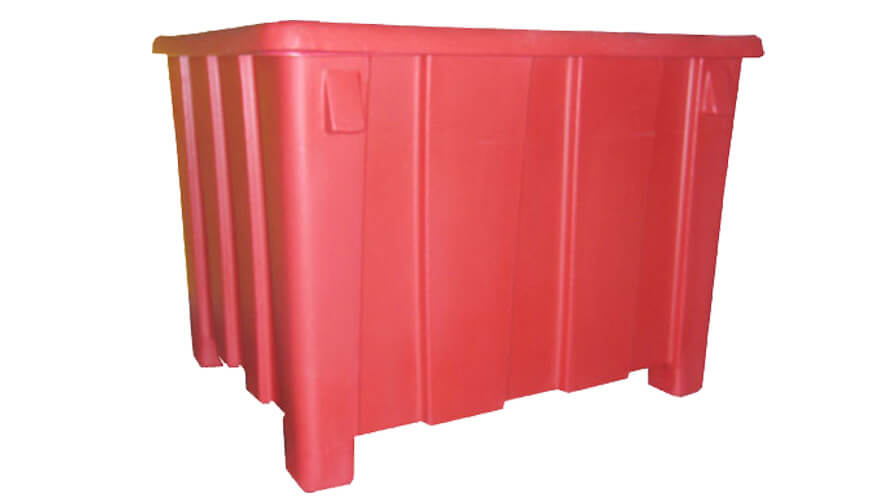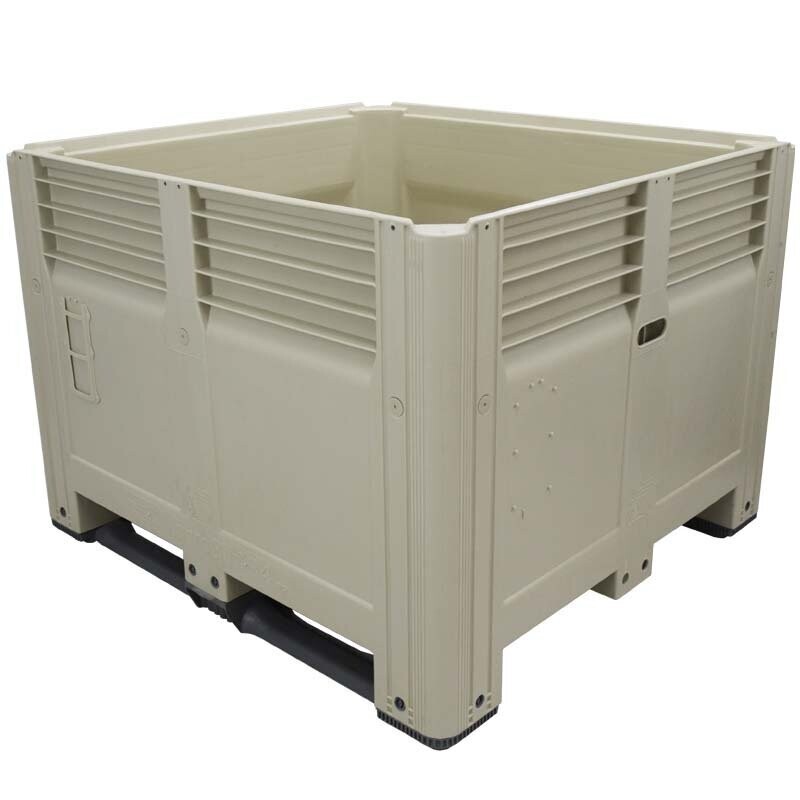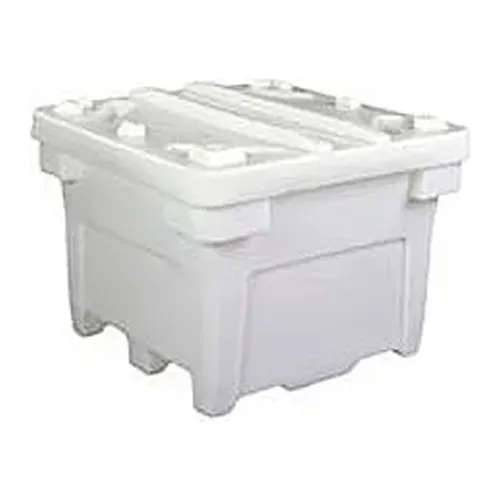The Function of Mass Plastic Containers in Effective Recycling Practices and Sustainability
Bulk plastic containers are integral to contemporary reusing initiatives. Their design boosts the effectiveness of material collection and transport, adding to sustainability goals. These containers not just maximize room but also help in monitoring contamination degrees. Their execution is not without difficulties. Understanding the complete extent of their effect discloses a complex partnership in between logistics and ecological duty that warrants additional expedition.
Understanding Mass Plastic Containers
Bulk plastic containers act as an important element in different industries, assisting in the storage space and transport of products. These containers are generally made from durable products such as high-density polyethylene (HDPE) or polypropylene, which give longevity and resistance to ecological aspects. Their design often consists of functions like stackability and modularity, enabling effective use room throughout both storage and transportation.
Industries such as agriculture, food handling, and manufacturing regularly use bulk plastic containers due to their lightweight nature and ease of handling. The containers come in numerous dimensions and configurations, dealing with the particular requirements of various items. Their adaptability prolongs beyond plain performance; they can additionally be personalized with lids, handles, and labeling choices to improve functionality - plastic bulk containers. Consequently, mass plastic containers play an essential duty in maximizing logistics and supply chain procedures throughout numerous fields, consequently adding to total efficiency and cost-effectiveness
Benefits of Making Use Of Mass Plastic Containers in Recycling
The usage of bulk plastic containers significantly improves the effectiveness of the procedure when organizations focus on reusing efforts. These containers are developed to maximize area, enabling the storage space and transport of larger quantities of recyclable materials. This causes fewer journeys to recycling facilities, thus minimizing fuel usage and connected exhausts.
In addition, bulk plastic containers are sturdy and resistant to numerous environmental aspects, making sure that products remain safeguarded during handling and transit. Their lightweight design further adds to decrease transport expenses.
The uniformity of these containers assists in better sorting and processing of recyclable products, which can boost total recycling rates. Organizations that embrace bulk plastic containers additionally demonstrate a dedication to sustainability, favorably influencing their brand name picture. Inevitably, these advantages not only simplify reusing methods however additionally add to broader ecological objectives
How Bulk Plastic Containers Facilitate Product Collection
Reliable product collection is substantially enhanced by the usage of bulk plastic containers, as they give a reliable and organized option for gathering recyclable products. These containers are created to suit huge quantities of materials, which streamlines the sorting and storage process. Their stackable design takes full advantage of area application, making it easier for centers to organize recyclables without mess.
On top of that, mass plastic containers are sturdy and weather-resistant, enabling outdoor positioning without destruction. This resilience guarantees that products continue to be secured till they are accumulated for handling.

The uniformity in shapes and size of these containers helps with standardization across collection factors, enabling far better monitoring of recyclable volumes. Additionally, their transparent nature enables for very easy presence of components, helping in the tracking of contamination levels and guaranteeing that just ideal products are collected. In general, bulk plastic containers play a crucial function in enhancing the material collection process, thus promoting effective recycling methods.
Transport Efficiency and Environmental Impact
Transport effectiveness plays an important role in the reusing process, specifically through the optimization of tons capability wholesale plastic containers. By taking full advantage of the volume of product transported, companies can considerably reduce the number of trips needed, consequently reducing their carbon footprint. This method not just enhances functional effectiveness yet also contributes to much more sustainable environmental practices.

Optimizing Lots Capability
Although enhancing load ability is frequently neglected, it plays an important role in boosting transport effectiveness and reducing environmental influence in recycling techniques. By taking full advantage of the quantity that mass plastic containers can hold, recycling procedures can decrease the variety of trips required for transport. This not only lowers gas intake but additionally decreases the wear and tear on vehicles. Effective tons administration allows centers to make use of space properly, making certain that each transport cycle is as efficient as feasible. Additionally, well-optimized lots can lead to better negotiations with logistics providers, possibly decreasing overall expenses. Eventually, boosting load capability adds to a more sustainable recycling system by cultivating effective source use and lessening waste created during transportation.
Minimizing Carbon Footprint
As recycling procedures endeavor to decrease their environmental impact, minimizing the carbon footprint related to transport arises as a crucial goal. Bulk plastic containers play an important function in achieving this aim by enhancing tons effectiveness and enhancing logistics. Their light-weight yet sturdy layout enables optimum freight room usage, reducing the number of journeys required to transport materials. By combining deliveries, reusing centers can lower gas consumption and greenhouse gas emissions. Furthermore, strategically situating recycling facilities reduces transport distances, furthermore lowering carbon outputs. Furthermore, employing fuel-efficient lorries and different power resources improves total sustainability. By incorporating these practices, the reusing sector can significantly decrease its carbon footprint, adding to an extra lasting future.
Obstacles in using Bulk Plastic Containers

Contamination Concerns
Contamination problems represent a substantial difficulty in the efficient use bulk plastic containers within reusing techniques. These containers commonly collect deposits from previous contents, resulting in blended materials that can impede the reusing process. Contaminants such as food waste, chemicals, or non-recyclable products can endanger the integrity of the entire batch, leading to boosted disposal prices and lowered recycling rates. Furthermore, incorrect cleaning or sorting can intensify these problems, making it tough for reusing facilities to process materials effectively. The existence of contaminants not only impacts the top quality of recycled items yet likewise weakens the general sustainability initiatives intended at lowering plastic waste. Dealing with these contamination difficulties is critical for enhancing the efficacy of mass plastic container recycling.
Recycling Framework Limitations
Inadequacy in reusing infrastructure positions significant challenges this article for the effective administration of bulk plastic containers. Lots of reusing centers do not have the capability to process large volumes of these containers efficiently, resulting in increased costs and hold-ups. Inadequate sorting modern technologies usually lead to contamination, as bulk containers may be mixed with other materials, complicating the reusing procedure. Limited transportation options likewise impede the movement of mass plastic containers to appropriate reusing facilities, resulting in increased land fill waste. Furthermore, a lack of standard protocols for mass container recycling develops confusion amongst consumers and organizations, even more making complex efforts to promote sustainability. Addressing these infrastructure constraints is essential to boost reusing methods and maximize the capacity of mass plastic containers in a circular economic situation.
Best Practices for Applying Bulk Plastic Containers
When organizations think about implementing bulk plastic containers in their reusing practices, they must focus on a tactical technique that enhances efficiency and lowers contamination risks. Initially, choosing the proper container size and type is important to suit the quantity of products being processed. Organizations should also establish clear labeling and signage to direct individuals on appropriate disposal approaches, reducing confusion and errors. Regular training sessions for team can even more strengthen these methods, making sure every person understands their duties in maintaining reusing integrity.
Additionally, organizations ought to execute a routine maintenance schedule to evaluate and clean containers, avoiding the buildup of contaminants. Partnering with local recycling facilities can likewise enhance the collection procedure, making certain that products are successfully processed. Finally, organizations must check and evaluate their recycling metrics, utilizing this data to fine-tune methods with time and advertise continuous renovation in their sustainability initiatives.
The Future of Mass Plastic Containers in Sustainable Practices
As companies significantly prioritize sustainability, the role of mass plastic containers in recycling practices is established to progress considerably. Innovations in products science are causing the development of biodegradable and recyclable options, enhancing the environmental benefits of mass plastic containers. In addition, the application of closed-loop systems will allow for less complicated collection and repurposing of these containers, lowering waste and source consumption.
Technical innovations, such as wise radar, will enable companies to check the lifecycle of bulk containers, enhancing efficiency in recycling processes. As customer demand for lasting methods grows, services will likely adopt mass plastic containers designed for reuse and long-lasting value. In addition, collaboration between federal governments and sectors will promote the facility of standard recycling procedures, making certain that bulk containers are successfully incorporated right into broader sustainability campaigns. In general, the future of mass plastic containers shows up promising, with considerable possibility for adding to a round economic situation.
Regularly Asked Concerns
Exactly How Are Bulk Plastic Containers Made and What Materials Are Utilized?
Bulk plastic containers are normally made from high-density polyethylene (HDPE) or polypropylene (PP) These products are refined via injection molding or blow molding techniques, causing sturdy, lightweight containers appropriate for various storage and transport requirements.
Can Bulk Plastic Containers Be Recycled Numerous Times Prior To Recycling?
Yes, bulk plastic containers can be recycled multiple times prior to recycling. Their durability and design enable repeated usage in different applications, promoting sustainability and resource performance while decreasing the need for brand-new containers.

What Certifications Exist for Bulk Plastic Containers in Recycling?
Various certifications for mass plastic containers consist of the Recycling Collaboration's certification, the Cradle to Cradle Qualified ™ criterion, and the Lasting Packaging Coalition's standards, guaranteeing containers satisfy certain environmental and recyclability standards for reliable recycling.
How Do Bulk Plastic Containers Contrast to Other Recycling Storage Options?
Mass plastic containers use higher longevity and capacity compared to other recycling storage space get more options, lowering the risk of contamination and promoting effective transport. Their design supports far better organization, improving general performance in recycling procedures.
What Is the Life expectancy of a Mass Plastic Container in Recycling Processes?
The life-span of a mass plastic container in recycling procedures generally varies from 5 to one decade, depending upon use, worldly top quality, and environmental problems, enabling multiple cycles of usage before ultimate disposal or recycling.
When companies focus on recycling initiatives, the use of bulk plastic containers considerably improves the efficiency of the process. Transportation effectiveness plays a vital duty in the recycling procedure, particularly with the optimization of lots ability in mass plastic containers. The use of bulk plastic containers in recycling methods faces substantial challenges, especially concerning contamination issues and constraints within reusing this framework. Contamination issues stand for a significant obstacle in the efficient usage of bulk plastic containers within recycling methods. When organizations think about executing mass plastic containers in their recycling techniques, they should focus on a critical technique that improves effectiveness and reduces contamination dangers.